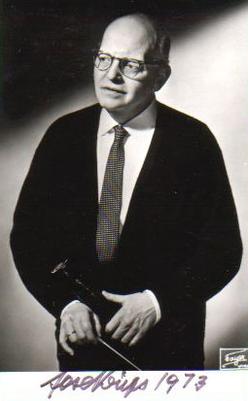Josef Krips facts for kids
Josef Alois Krips (born April 8, 1902 – died October 13, 1974) was a talented Austrian conductor and violinist. A conductor is someone who leads an orchestra or choir, telling the musicians when and how to play. Krips was known for his clear and elegant conducting style.
Contents
Josef Krips's Early Life and Career
Josef Krips was born in Vienna, Austria. His father was a doctor and loved to sing, and his mother's name was Aloisia. Josef was one of five brothers. He studied music with famous teachers like Felix Weingartner.
From 1921 to 1924, Krips worked as an assistant to Weingartner at the Vienna Volksoper. He also helped musicians practice their parts (this job is called a répétiteur) and led the choir. After that, he conducted several orchestras, including one in Karlsruhe, Germany, from 1926 to 1933.
In 1933, Krips returned to Vienna. He became a regular conductor at the Volksoper and the Wiener Staatsoper (Vienna State Opera). In 1935, he became a professor at the Vienna Academy of Fine Arts. He also conducted often at the important Salzburg Festival between 1935 and 1938.
Life During World War II
In 1938, a big change happened in Austria. Nazi Germany took control of Austria in an event called the Anschluss. Because Josef Krips's father was Jewish, the Nazi government would not allow Krips to work in music, even though Josef himself was raised Catholic.
So, Krips had to leave Austria. He moved to Belgrade, a city in Yugoslavia, where he worked with the Belgrade Opera and Philharmonic for a year. But then, World War II started, and Yugoslavia also became involved. For the rest of the war, Krips had to work in a food factory as a clerk to survive.
After the War: A New Beginning
When World War II ended in 1945, Krips returned to Austria. He was one of the few conductors allowed to perform right away. This was because he had not worked for the Nazi government during the war.
He was the first person to conduct the famous Vienna Philharmonic orchestra and the Salzburg Festival after the war. Working with other conductors, Krips helped bring the Vienna State Opera and the Vienna Philharmonic back to their excellent pre-war standards.
Leading Orchestras in the United States and Beyond
From 1950 to 1954, Krips was the main conductor of the London Symphony Orchestra in England. After that, he moved to the United States and led the Buffalo Philharmonic Orchestra from 1954 to 1963.
Under Krips's leadership, the Buffalo Philharmonic grew. They performed for longer seasons and hired more musicians. Krips took the orchestra on tours across the eastern United States and Canada. He mostly focused on classical and romantic music from Europe during this time.
Krips also conducted other orchestras as a guest. For example, in 1960, he led the Montreal Symphony Orchestra in Canada. In 1964, he was a guest conductor for the New York Philharmonic.
From 1963 to 1970, Krips was the Music Director of the San Francisco Symphony. He conducted many different pieces, including 91 works by composers from the 20th century. He also conducted the very first performances of some new pieces, like Kirke Mechem's First Symphony in 1965.
Later in his career, Krips made his debut at the Metropolitan Opera in New York in 1966. He also became the conductor of the Deutsche Oper in Berlin in 1970. Between 1970 and 1973, he was the main conductor of the Vienna Symphony.
Josef Krips passed away in Geneva, Switzerland, in 1974, at the age of 72.
Josef Krips's Family Life
Josef Krips was married three times during his life.
His first wife was Maria Heller. She ran a fashion salon. They got married in Vienna in 1925, but sadly, Maria died in a car accident in 1928.
His second wife was Maria "Mitzi" Wilheim, a singer. They married in 1947 and stayed together until she passed away in 1969.
Krips married his third wife, Harrietta Freün von Prochazka, in October 1969. She had been his secretary. She passed away in 2015.
Josef Krips also had a brother named Henry Krips, who was also a conductor. Henry moved to Australia and was the chief conductor of the South Australian Symphony Orchestra for 23 years. The two brothers even conducted together at a concert in 1963.
Josef Krips's Recordings
Josef Krips made many recordings throughout his career, allowing people to listen to his music for years to come.
His very first recording was made in Vienna in 1937. He conducted the Orchestra of the Wiener Staatsoper for two songs from an operetta.
In 1947, Krips and the National Symphony Orchestra recorded famous waltzes by Strauss, like "The Blue Danube." In 1950, he made a popular recording of Mozart's Jupiter Symphony with the London Symphony Orchestra.
One of his most famous recordings was in 1955: Mozart's opera Don Giovanni with the Vienna State Opera.
From 1956 to 1958, Krips recorded all five of Beethoven's piano concertos with the famous pianist Arthur Rubinstein. They also recorded Brahms's Second Piano Concerto together.
Between 1950 and 1958, Krips recorded many works by composers like Mozart, Brahms, Dvořák, Schubert, Schumann, Tchaikovsky, Beethoven, Johann Strauss, Richard Strauss, Haydn, and Felix Mendelssohn. He worked with orchestras like the Vienna Philharmonic, the London Symphony Orchestra, and the Israel Philharmonic Orchestra.
In 1960, Krips recorded all nine of Beethoven's symphonies with the London Symphony Orchestra. This set of recordings was very popular with both music critics and the public.
In the 1970s, Krips recorded some of Mozart's later symphonies with the Royal Concertgebouw Orchestra. These recordings have been reissued many times.
Even though he didn't make commercial recordings with the San Francisco Symphony, many of his concerts with them were broadcast on the radio.
See also
 In Spanish: Josef Krips para niños
In Spanish: Josef Krips para niños
 | Selma Burke |
 | Pauline Powell Burns |
 | Frederick J. Brown |
 | Robert Blackburn |


